Challenge
You get it. You’ve grasped an important scientific theory, concept or principle.
Now can you share your insight?
An inventive video can get across complex material that would take pages of text to communicate.
To take part in the Breakthrough Junior Challenge, create a short video (2:00 – two minutes max) to explain a big idea in one of these fields:
- Physics
- Mathematics
- Life Sciences
Your film can take any form you like: animation, talking head, documentary, dramatic reconstruction, whatever. It’s worth keeping in mind that video is a dynamic visual medium – using diagrams, simulations, physical demonstrations etc. is a lot more effective than standing in front of a blackboard talking.
The videos will be judged according to the following criteria:
- Engagement
- Illumination
- Creativity
- Difficulty
If you’re looking for guidance, you can see some of last year’s top-scoring entries here and below. But remember, to show ‘creativity’ your film should be as original as possible.
Watch winners of the past years
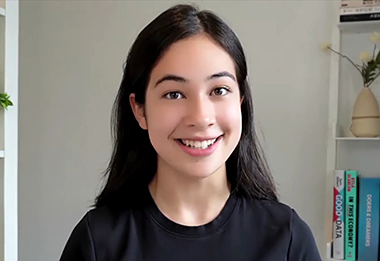 Jasmine Eyal, 16, Czech Republic/Singapore
2024 winner
Jasmine Eyal, 16, Czech Republic/Singapore
2024 winner
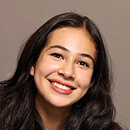
Mechanogenetic Cellular Engineering
Jasmine Eyal, 16, Czech Republic / Singapore
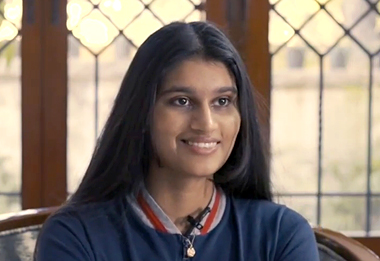 Sia Godika, 17, India
2023 winner
Sia Godika, 17, India
2023 winner
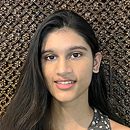
Yamanaka Factors
Sia Godika, 17, India
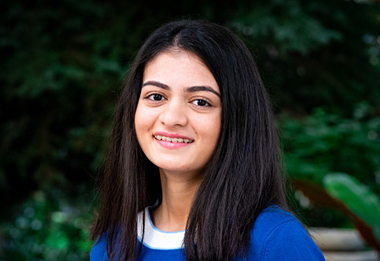 Noor Haideri, 16, USA
2022 winner
Noor Haideri, 16, USA
2022 winner
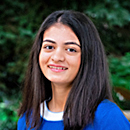
Light and Sleep Cycle
Noor Haideri, 16, USA
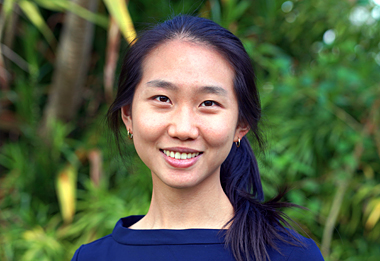 Amber Kwok, 18, Mauritius
2021 winner
Amber Kwok, 18, Mauritius
2021 winner
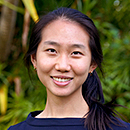
Van der Waals and Casimir Forces
Amber Kwok, 18, Mauritius
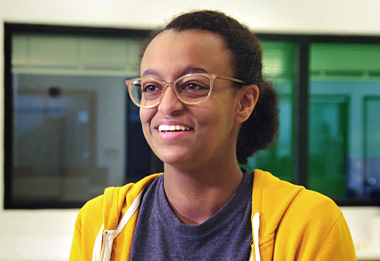 Maryam Tsegaye, 17, Canada
2020 winner
Maryam Tsegaye, 17, Canada
2020 winner
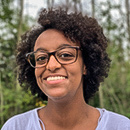
Quantum Tunneling
Maryam Tsegaye, 17, Canada
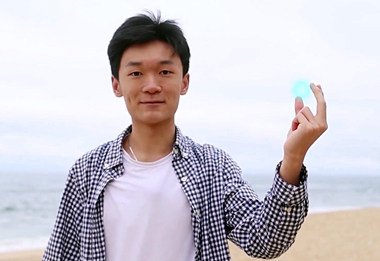 Jeffery Chen, 17, United States
2019 winner
Jeffery Chen, 17, United States
2019 winner
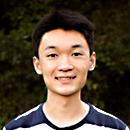
Neutrino Astronomy: A New Frontier
Jeffery Chen, 17, United States
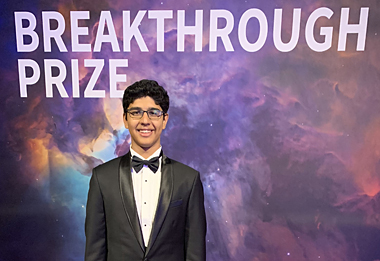 Samay Godika, 16, India
2018 winner
Samay Godika, 16, India
2018 winner
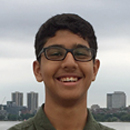
Circadian Rhythm
Samay Godika, 16, India
National Public School, Koramangala
Bio:
Samay Godika is a 16-year-old student from Bangalore, India. As well as winning the 2018 Breakthrough Junior Challenge, he was a Finalist and the Global Popular Vote Winner in the 2017 competition. In ninth grade, Samay was selected by Massachusetts Institute of Technology (MIT) for their Launch Entrepreneurship Program. Out of 80 students selected for the program, he was one of just seven ninth graders selected from all over the world. In 2013, Samay was part of a team that reached the National Round of the World Robotics Olympiad. In 2016, he was part of a team that collected over 500 pairs of uniforms and shoes and distributed them to underprivileged school-children. In December 2017, Samay was invited by TEDxLavelleRoad to give a talk about the various lessons he imbibed during his experience of the Breakthrough Junior Challenge and MIT Launch.
Acceptance remarks:
My interest in science has been driven by personal experiences. A family member has Parkinson’s disease, and in that context I came across autophagy (the topic of my first Breakthrough Junior Challenge video). I myself suffer from asthma, and had noticed that attacks peaked in the early morning – which got me interested in Circadian Rhythm, the topic of my second video, which won the competition this year. A combination of neuroscience and data science skills could enable me to devise solutions for some of the most debilitating diseases faced by humanity. I am exploring the possibility of early diagnosis of Parkinson's disease by applying AI to voice data. Another area I am looking at is identifying autophagy-modulating compounds via computer vision. Overall, I am intrigued by the idea of leveraging multi-disciplinary topics to solve problems. Additionally, given the rapid pace of technological evolution, there is an urgent need to keep students engaged in STEM subjects. When taught using storytelling, animation and AR/VR, these subjects can hold the attention of young people. I would also like to explore a business that combines storytelling with teaching.
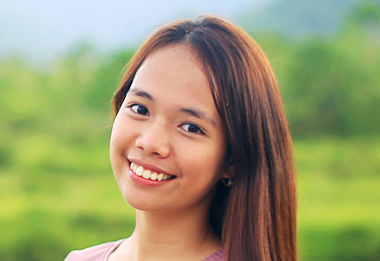 Hillary Diane Andales, 18, Philippines
2017 winner
Hillary Diane Andales, 18, Philippines
2017 winner

Relativity & The Equivalence
of Reference Frames
Hillary Diane Andales, 18, Philippines
Philippine Science High School – Eastern Visayas Campus
Bio:
Hillary Andales is from Tacloban City, Leyte, Philippines. In addition to winning the 2017 Breakthrough Junior Challenge and becoming regional champion for Asia, she also won the Popular Vote in the 2016 Challenge. She has been Division Finals Champion every year for the last decade in the Metrobank-MTAP-DepEd Math Challenge. Hillary has led the Regional Council of the Philippine Society of Youth Science Clubs and been a delegate at the Japan-Asia Youth Exchange Program in Science. She authored a mathematics review book for grade 5 and 6 students, and was a managing editor of her school paper, The Science Net.
Acceptance remarks:
Growing up in an academic family, I was exposed to the rigid yet fascinating world of scientific thinking. As a five-year-old, I remember arguing with my friends that pointing their fingers at a rainbow will not cut their digits off. At ten, I became intrigued about evolution and DNA replication. However, physics was special. At 13, I knew about quantum mechanics and relativity. I learned about a cat that was both dead and alive, a universe that came from almost nothing, and a Theory of Everything that is yet to be known. Maybe I can be a physics researcher so I could think about these problems. But after experiencing the Breakthrough Junior Challenge the last two years, I also discovered the importance of sharing physics with people. So maybe I can be a science communicator. Maybe I can become both! Physics is beautiful and I want to keep uncovering more of its glory; but I also want to share it with others. My future is clouded with uncertainty but I’m certain about where my heart leads me – to physics.
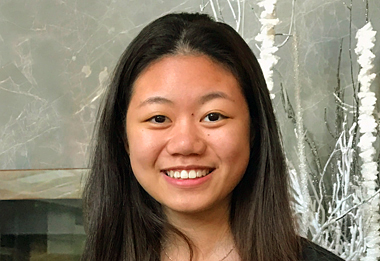 Deanna See, 17, Singapore
2016 winner
Deanna See, 17, Singapore
2016 winner
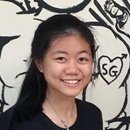
Superbugs!
And Our Race Against Resistance
Deanna See, 17, Singapore
Acceptance remarks at the 2016 Breakthrough Prize Ceremony in Silicon Valley, CA:
If you try asking “why” enough times about something you’ve experienced, you’ll probably stumble upon a science concept that explains your question. It’s important to learn about the sciences to understand how the world really works. Going one step further, if we can’t find the right concepts to answer our question, that opens up a new area of science to investigate and find our own explanations for. Learning about science is not just important to understand our present world, but to improve what we know about it too.
At the moment I’m most interested in working on something in the life sciences, like bioengineering or biomedical sciences. I’ve always liked biology because of its close relationship to the concept of life, be it our origins or the processes in our bodies that allow us to live and breathe. I think there are lots of discoveries to be made in the life sciences which directly impact our lives, like discoveries that could end our race against antibiotic-resistant bacteria. The opportunity to understand our world more intimately, while finding new ways to improve our quality of life, inspires me to pursue the life sciences.
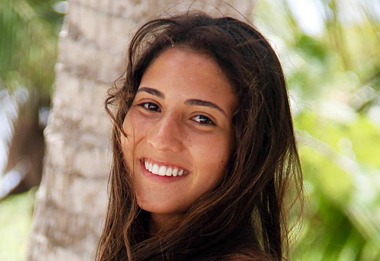 Antonella Masini, 18, Peru
2016 winner
Antonella Masini, 18, Peru
2016 winner
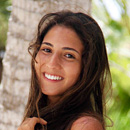
Quantum Entanglement
Antonella Masini, 18, Peru
Acceptance remarks at the 2016 Breakthrough Prize Ceremony in Silicon Valley, CA:
Since I was little, I have been a Harry Potter fan. Whenever someone asked me what I wanted to be when I grew up I answered without hesitation: "A wizard, obviously!" However, as years went by, I learned that unfortunately that career path wasn't an option... or was it? I think that physics is the bridge which connects our world to science fiction. That is why I really want to dive into physics and its applications in the development of technology – because for me that is where magic hides in our world.
Learning about the sciences is learning about the world – even about yourself, about your legacy. Nowadays, the world is more in need of scientists who are not afraid to make changes and discover the truth behind our existence. These subjects are important because they spark curiosity in people's minds. They force you to ask "how" and "why," but also to look by yourself for the answer. Science and math are all around us and we should not avoid them. I find it very sad when sometimes adults omit certain topics because they believe that their students will not be able to understand them. This is a terrible mistake. Make young minds struggle, in order for them to become richer in knowledge. Make young minds ask questions, so that they have the chance to look for the path of the truth. Make young minds think, because that is the best gift that a student can receive from their teacher. This is why I think that we should learn more about these subjects: because they make you a better person.
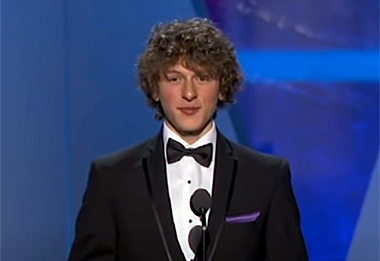 Ryan Chester, 18, United States
2015 winner
Ryan Chester, 18, United States
2015 winner
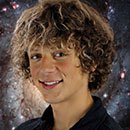
The Special Theory of Relativity
Ryan Chester, 18, United States
"Special Relativity has got to rank up there with one of the most revolutionary theories in physics. I've seen it referenced in science books and magazines for years. It was always mentioned in relationship to the idea that you can travel forward in time if you just move fast enough. Time dilation has been in science TV shows and movies like Interstellar so often that I've just accepted it without understanding why it was true. So when this challenge came around I thought this area was a great one to dig into."